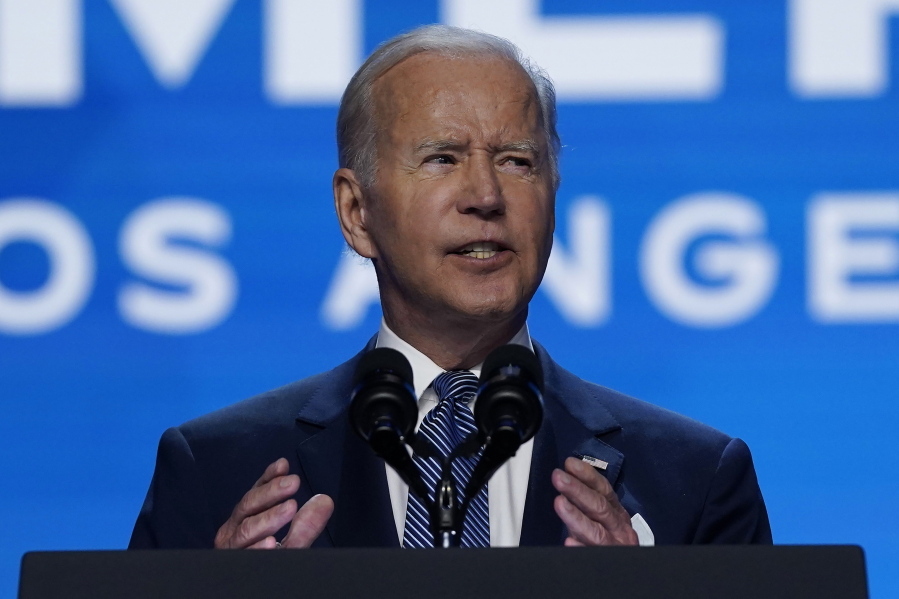LOS ANGELES (AP) — President Joe Biden tried to present a unifying vision for the Western Hemisphere on Thursday even as the Summit of the Americas has been wracked by divisions and absences that make it hard to bring North and South America together around shared goals on migration, the economy and climate.
The disparities in wealth, governance and national interests mean it is challenging for Biden to duplicate the partnerships he has assembled in Asia and Europe. That has created limited expectations at a summit that the United States is hosting for the first time since 1994.
With diplomatic efforts strained by summit boycotts and legislative proposals stranded in a polarized Congress, Biden focused on trying to get corporations and the private sector behind his efforts. His administration hopes the financial ties will help to bridge regional differences while fostering economic growth and greater equality.
“My challenge to all of you is if you step up and play a bigger role in driving inclusive, sustainable, equitable growth in the 21st century, a lot’s going to happen,” Biden said in an address to CEOs. ”None of us will be able to fully realize our ambition for the region on our own.”
Before Biden took the stage, the backdrop was an animation that showed fragments of colors flying together to neatly form a map of North and South America. Yet in reality the process has hardly been as synchronized, particularly with the notable summit boycott by Mexico’s president and uncertainty as to whether the right incentives exist for Latin America to draw more closely to the U.S.
“It’s always been difficult to find consensus in Latin America,” said Ryan Berg, a senior fellow at the Center for Strategic and International Studies, a Washington-based think tank. “This is a hugely diverse region, and it’s obviously difficult for it to speak with one voice.”
On a busy day of diplomacy, the U.S. president met with Canadian Prime Minister Justin Trudeau, was to hold talks with Brazilian President Jair Bolsonaro and give a speech to the broader group of attendees. Vice President Kamala Harris was meeting with Caribbean leaders to talk about clean energy, and first lady Jill Biden was hosting a brunch to build relationships with fellow spouses.
The day was to end with a dinner at the Getty Villa, an art museum with views of the Pacific Ocean.
There could be tension when Biden meets for the first time with Bolsonaro, an ally of former President Donald Trump. Bolsonaro is running for a second term and has been casting doubt on the credibility of his country’s elections, something that has alarmed officials in Washington.
When Bolsonaro accepted an invitation to the summit, he asked that Biden not confront him over his election attacks, according to three of the Brazilian leader’s Cabinet ministers who requested anonymity to discuss the issue.
Jake Sullivan, Biden’s national security adviser, rejected the idea that Biden had agreed to any conditions for the meeting with Bolsonaro.
“There are no topics off limits in any bilateral the president does, including with President Bolsonaro,” Sullivan told reporters. He added, “I do anticipate that the president will discuss open, free, fair and transparent democratic elections.”
The nature of democracy itself became a sticking point when planning the guest list for the event. Mexican President Andrés Manuel López Obrador wanted the leaders of Venezuela, Cuba and Nicaragua to be invited, but the U.S. resisted because it considers them authoritarians.
Ultimately an agreement could not be reached, and López Obrador decided not to attend. Neither did the presidents of Honduras, Guatemala and El Salvador.
Honduras; foreign relations secretary, Eduardo Enrique Reina, spoke about President Xiomara Castro’s decision to stay away.
“The president was very clear that this should be a summit without exclusions,” Reina said. Still, he said the Honduran government was ready to work on common problems, saying, “The political will to work with all countries in the Americas is there.”
It’s a reminder that relations with Latin America have proved tricky for the administration even as it solidifies ties in Europe, where Russia’s invasion of Ukraine has prompted closer cooperation, and in Asia, where China’s rising influence has rattled some countries in the region.
One challenge is the unmistakable power imbalance in the hemisphere.
World Bank data shows that the U.S. economy is more than 14 times the size of Brazil, the next-largest economy at the summit. The sanctions the U.S. and its allies levied against Russia are much harder in Brazil, which imports fertilizer from Russia. Trade data indicates the region has deepening ties with China, which has also made investments.
This leaves the U.S. in a position of showing Latin America why a tighter relationship with Washington would be more beneficial at a time when economies are still struggling to emerge from the pandemic and inflation has worsened conditions.
Sullivan pledged that the U.S. “will be putting specific dollars into producing tangible results” in the region, with worker training and money for food security, among other things.
“When you tally all that up and look at the practical impact of what the summit deliverables from the United States will mean for the public sphere, it is significantly more impactful on the actual lives and livelihoods of the people of this region than the kinds of extractive projects that China has been invested in,” he said.
Harris has been emphasizing private sector investment to address the region’s challenges, particularly when it comes to reducing migration by offering more economic opportunity in people’s home countries.



